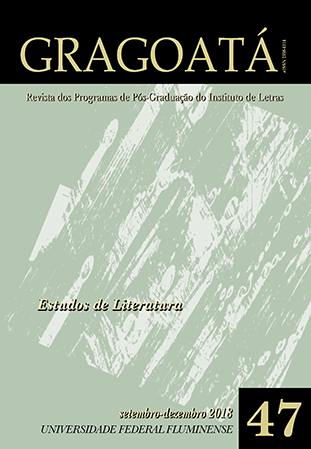Monstrous spaces: Gothic in fictionalization of Pedra Bonita and Canudos
DOI:
https://doi.org/10.22409/gragoata.v23i47.33609Keywords:
gothic poetics, loci horribiles, Brazilian literature, messianic movements.Abstract
Despite of what Brazilian literary criticism and historiography of 19th and 20th centuries declare, Gothic can be found in Brazilian literature. Recent studies have shown that regionalist fiction is one of the most developed proses in Brazilian terror, horror and thriller literature, characterizing the up-country, specially the sertões, as an authentic locus horribilis. In the novels O reino encantado: crônica sebastianista (1878), by Araripe Júnior, and Os Jagunços: novela sertaneja (1898), by Afonso Arinos, their narrators, to describe the messianic movements of Pedra Bonita and Canudos respectively, use a horrifying and macabre language to turn the Brazilian Northeastern landscape into a gloomy and obscure scenery. Both narratives explore the space not only as the stage in which the atrocities of the plots are practiced and suffered, but also as the main narrative element that constitutes an oppressive and fatal atmosphere. While O reino encantado describes the place of Pedra Bonita’s rituals to evoke feelings of horror and fear, Os Jagunços uses the sertaneja nature to demonstrate the republican soldiers’ terror in front of the canudenses.
---
Downloads
Downloads
Published
How to Cite
Issue
Section
License
Authors who publish in Gragoatá agree to the following terms:
The authors retain the rights and give the journal the right to the first publication, simultaneously subject to a Creative Commons license CC-BY-NC 4.0, which allows sharing by third parties with due mention to the author and the first publication by Gragoatá.
Authors may enter into additional and separate contractual arrangements for the non-exclusive distribution of the published version of the work (for example, posting it in an institutional repository or publishing it in a book), with recognition of its initial publication in Gragoatá.

Gragoatá is licensed under a Creative Commons - Attribution-NonCommercial 4.0 International.











